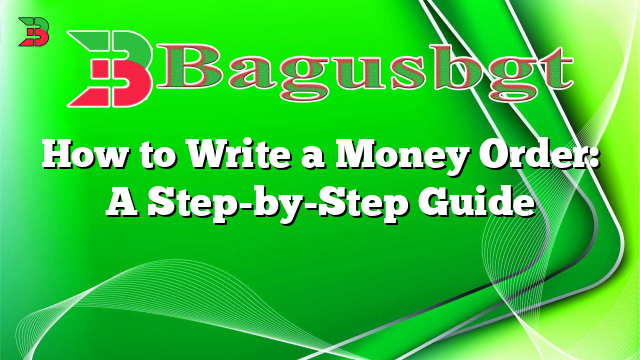Hello there! Are you looking to send money securely and conveniently? Look no further! In this comprehensive guide, we will walk you through the process of writing a money order step by step. Whether you are sending money domestically or internationally, this article will provide you with the necessary information to ensure a smooth transaction.
1. Gather the Required Information
Before you start writing a money order, it is essential to gather all the necessary information. You will need the recipient’s full name, address, and the exact amount you wish to send. Make sure to double-check the accuracy of this information to avoid any complications later on.
2. Choose a Reliable Provider
When it comes to money orders, selecting a trustworthy provider is crucial. Research different financial institutions or post offices that offer money order services. Compare their fees, exchange rates (if applicable), and customer reviews to make an informed decision. Opting for a well-established and reputable provider will ensure the security of your funds.
3. Purchase the Money Order
Once you have chosen a provider, visit their nearest branch or website to purchase the money order. Specify the amount you want to send and provide the necessary details of the recipient. Some providers may require additional identification, so make sure to bring the required documents.
4. Fill Out the Money Order
On the money order form, you will find several fields that need to be completed. Start by writing your name and address in the “Purchaser” or “Remitter” section. This step is crucial to ensure that the money order is traceable in case of any issues.
5. Enter the Recipient’s Information
Next, carefully fill in the recipient’s full name, address, and any other required details in the designated fields. Ensure the information is accurate and matches the recipient’s identification to avoid any complications during the cashing process.
6. Add a Memo (Optional)
Some money orders provide a memo section where you can include a brief note or reference number. This step is optional but can be useful for both you and the recipient to keep track of the purpose of the transaction.
7. Sign the Money Order
Before submitting the money order, ensure that you sign it in the designated area. Your signature serves as authorization for the financial institution or post office to process the transaction. Avoid signing the money order until you are ready to send it to prevent any potential fraud.
8. Keep the Receipt
After completing the money order, detach the receipt from the form. The receipt contains essential information such as the money order number, date of purchase, and the amount sent. Keep this receipt in a safe place until the money order is cashed or if any issues arise.
9. Send or Deliver the Money Order
If you purchased the money order in person, you can hand it over to the recipient directly. However, if you opted for an online purchase, securely send the money order via mail or a trusted courier service. Ensure proper packaging to protect the money order from damage.
10. Track the Money Order
Once you have sent the money order, it is advisable to track its progress. Some providers offer tracking services that allow you to monitor the money order’s delivery status. This feature provides peace of mind and enables you to confirm when the recipient receives the funds.
Alternative Methods for Sending Money
While money orders are a reliable option, there are alternative methods available for sending money. Some popular alternatives include:
- Bank Transfers: Transfer funds directly from your bank account to the recipient’s account. This method is convenient, especially for recurring payments.
- Online Payment Services: Platforms like PayPal, Venmo, or Skrill allow you to send money electronically to individuals or businesses.
- Wire Transfers: Ideal for sending larger sums of money internationally, wire transfers provide a quick and secure way to transfer funds.
Money Order Writing Guide – Important Details
| Field | Information |
|---|---|
| Purchaser/Remitter | Your full name and address |
| Recipient | Full name and address of the person or business receiving the money order |
| Memo (optional) | Brief note or reference number |
| Signature | Sign in the designated area as authorization |
Frequently Asked Questions
Q: Are money orders secure?
A: Yes, money orders are considered a secure method of payment as they require upfront payment and can be traced if necessary.
Q: Can I cancel a money order?
A: Yes, most money orders can be canceled if the recipient has not cashed them yet. However, cancellation fees may apply.
Q: How long does it take for a money order to be cashed?
A: The time it takes for a money order to be cashed depends on various factors, including the recipient’s location and the provider’s policies. It can range from a few minutes to several days.
In Conclusion
Writing a money order is a simple and secure way to send funds to individuals or businesses. By following the steps outlined in this guide, you can ensure a smooth transaction and peace of mind. Remember to gather all necessary information, select a reliable provider, and fill out the money order accurately. Should you encounter any issues, consult the provider’s customer support for assistance. Now you are ready to send money safely and conveniently!
 Bagus Banget Kumpulan Informasi terbaru dari berbagai sumber yang terpercaya
Bagus Banget Kumpulan Informasi terbaru dari berbagai sumber yang terpercaya





